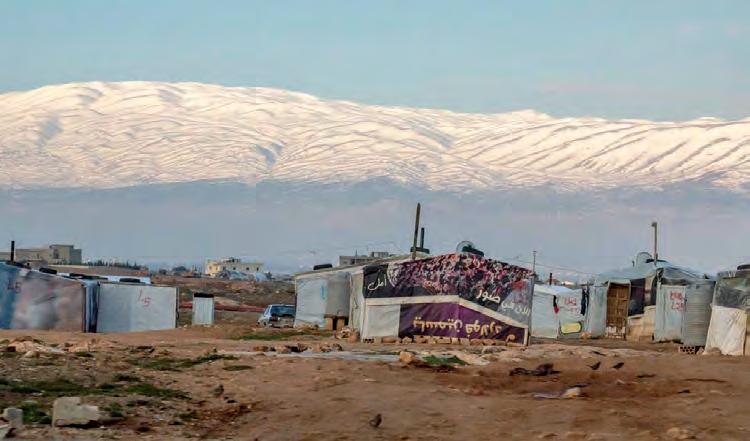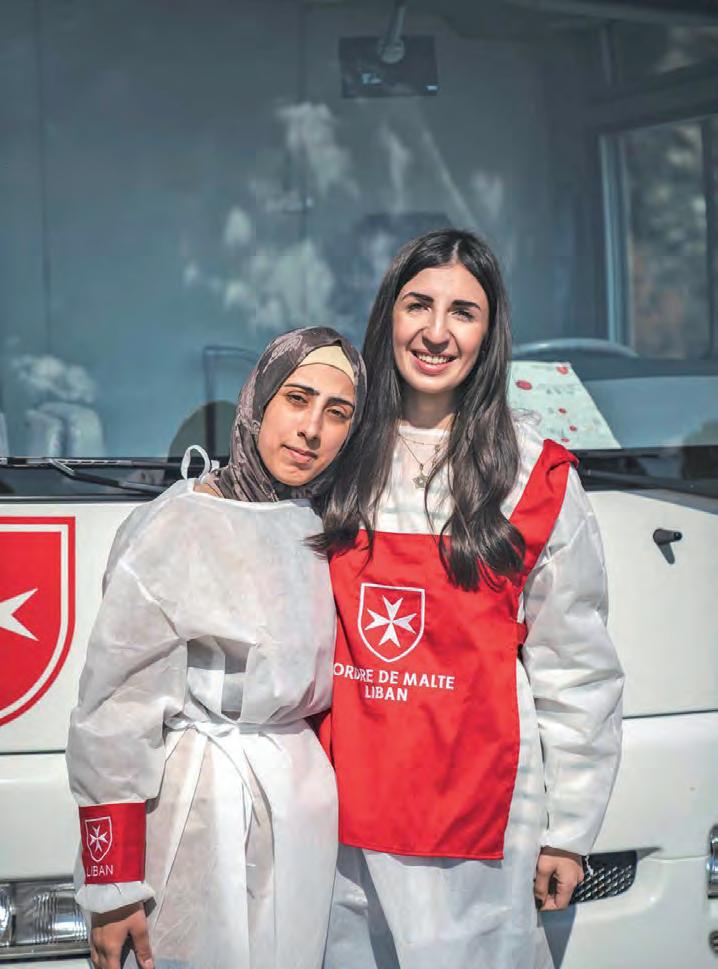
3 minute read
INTERNATIONAL Malteser
An overview of the amazing work of the international humanitarian relief
In 2021, Malteser International worked on more than 140 projects reaching people in need across 35 countries. The regional focus of its work was on the Middle East ($54M program funding), Africa ($30M program funding), Asia
War in Ukraine
Quickly after the war commenced, thanks to the existing structures of the Order of Malta Relief Organisations in Eastern Europe and its strong networks, aid for the people on the run could be quickly set in motion. The first relief supplies reached Western Ukraine
agency of the Order of Malta
Organisations in Poland, Romania, Hungary and Slovakia set up contact points for the arriving people, provided medical care, further transport and accommodations for the refugees.
Mobile Medical Units
Malteser International is undertaking around the world, taken from its 2021 Annual Report.
The Mobile Medical Unit (MMU) project was established as a mobile health system for Syrian refugees and Lebanese affected by conflict in 2015. Since then, demand has only increased. Today, it includes a total of four mobile clinics, each located in the regions of Akkar (north), Baalbek-Hermel (northeast), Nabatieh, and Tyre (south). The Baalbek-Hermel MMU base is located in Ras Baalbek, in the Beqaa Valley about 120 kilometres from Beirut.
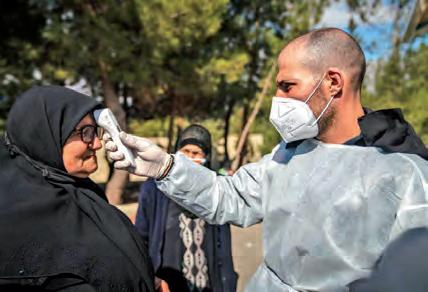
An impressive 28,000 people were served by the Mobile Medical Units in 2021 in the most remote regions of North and South Lebanon. In addition to mobile health care, Malteser International supports the development of local health structures in a four-year project. Part of the project is the modernisation of 11 health centres and the establishment of a training centre for medical staff in Beirut.
In addition to the Lebanon project, in the Democratic Republic of Congo and Colombia, Malteser International also uses mobile units to bring medical aid to people in remote, hard-to-reach regions.
In Myanmar, India (as part of our COVID-19 aid) and Bangladesh, mobile teams visit patients at home, providing medical advice and health prevention.
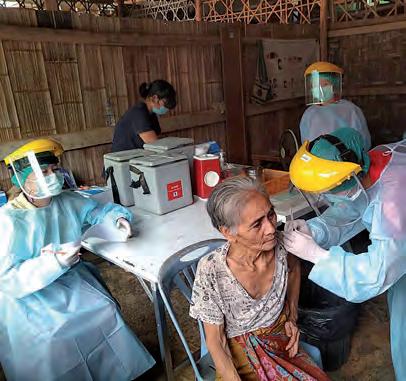
After the outbreak of war in Ukraine, a mobile medical unit supported the care of refugees at the Ukrainian border.
COVID-19 Support
The initial goal at the beginning of the pandemic was to continue vital relief programs despite lockdowns and restrictions, prevent the spread of the disease by supporting and strengthening health systems and water, sanitation and hygiene (WASH), and alleviate the economic impact of the pandemic on the poorest and most vulnerable through social programs.
The goal today is already a step further. It includes developing global solutions and guidelines to combat the pandemic, adapting and implementing them while considering the respective local conditions, together with teams on the ground and partner organisations.
One example is the organisation’s aid in Thailand. In the province of Mae Hong Son, in the north-west of the country, Malteser International supports refugees from neighbouring Myanmar in two camps. Up to 19,000 people are housed in cramped conditions – an ideal environment for the spread of the virus. However, except for a major outbreak in November 2021 that led to the temporary closure of both camps, the spread has been largely controlled thanks to strict measures, ranging from the usual hygiene efforts and an entry control for visitors and new arrivals, to the establishment of separate treatment centres for respiratory diseases as well as an isolation ward for COVID-19 cases.

One Health
Epidemics must be fought and prevented where people, animals and the environment meet. A full 75 per cent of emerging infectious diseases originate from human contact with animals.

That is why Malteser International is increasingly focusing on the One Health approach to prevent and control so-called zoonoses – infectious diseases that can be transmitted from animals to humans. In the DR Congo, a working group – including veterinarians, ecologists, environmentalists, agronomists, health the detection and prevention of disease transmission between humans and animals.
The first results are immediately being incorporated into the project work of Malteser International: in the provinces of Bas Uélé and Ituri in the DR Congo, as well as in the prefecture of Mbomou in the Central African Republic, ongoing pandemic prevention programs have been expanded to include measures in the areas of animal health, environmental protection, food and nutrition security, and agriculture.
Haiti
On 14 August 2021, another massive earthquake struck the Caribbean nation of Haiti. The Malteser International team, which has been working with local partner organisations in Haiti since 2010, was on the ground to help in the crisis region in the very first days.
When the earthquake struck, many medical facilities had been destroyed and there were many injured. Therefore, in the first emergency phase, Malteser International initially provided working medical facilities with consumables and medicines and supported particularly needy people such as women, elderly people and people with disabilities with the distribution of water, food, protective tarpaulins and cash.
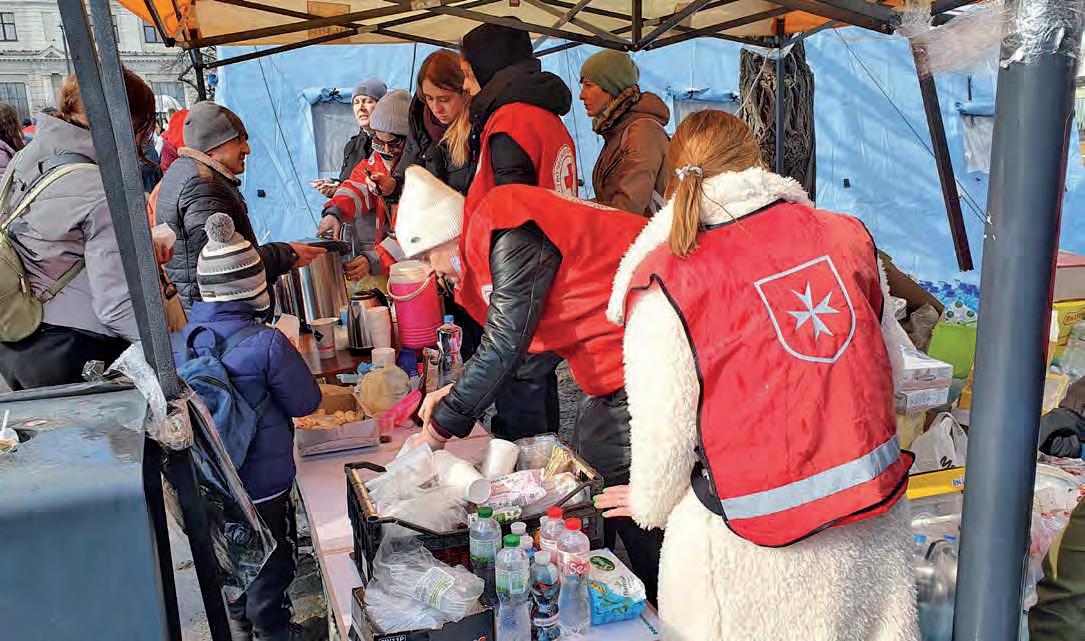
Malteser International then focused more on education, access to clean drinking water, continued support for medical centres and cash distributions, and comprehensive psychological support for people in affected rural areas and school children
Throughout 2021 Malteser International worked on more than 140 projects reaching people in need across 35 countries. The regional focus of its work was on the Middle East, Africa, Asia and the Americas. Health care remains the largest sector of its work, accounting for more than half of total program funding.
